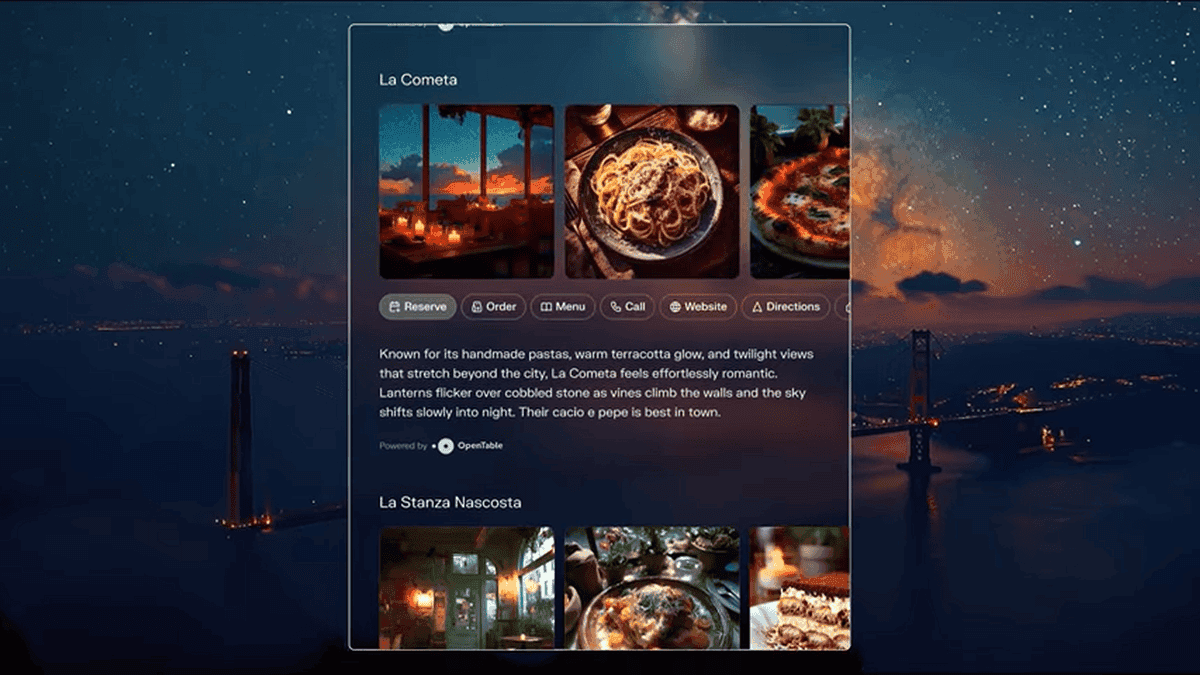Perplexity AI Integrates OpenTable for Seamless Restaurant Discovery and Booking
3 Sources
3 Sources
[1]
I used Perplexity to make a restaurant reservation - now I'm wondering if Google is holding us back
Instead of navigating between apps or tabs to find a restaurant and then book a table, Perplexity handles everything. Finding the perfect restaurant and making a reservation just got a whole lot easier thanks to a new feature in Perplexity. The chatbot (which ZDNET's Steven Vaughan-Nichols prefers over every other chatbot) announced a new partnership with OpenTable this week that lets you reserve a restaurant table straight from Perplexity. Also: I tested 3 text-to-speech AI models to see which is best - hear my results This means you can hit up the AI for ideas and make sure you have a table without switching between apps or tabs. To try out the new reservation mode, I presented Perplexity with a simple query: the best date night restaurants near me. But to go a step beyond what a simple Google search would do, I asked the AI to find date night spots located in historic buildings. As a bit of a foodie, I didn't expect to see anything unfamiliar on the list, but I was surprised by Perplexity's response. The AI curated a list of five local restaurants, two of which I had never heard of before. Beyond just listing locations, though, Perplexity also gave details about the history behind each building. I decided to give one of the new ones a shot. Perplexity's restaurant reservation feature isn't like ChatGPT's agent mode, which switches between two services; it actually uses the reservation platform. Making a reservation works exactly the same as if I went straight to OpenTable. After choosing a restaurant, I selected a date, time, and party size. The next screen asked for my contact information and any special requests, such as whether I was celebrating a birthday or anniversary. Once that was done, I had a table. I got a link to manage the reservation and email confirmation from OpenTable. I had no reason to doubt things worked correctly, but I was able to access my reservation by going directly through OpenTable, too. While I could accomplish the exact same thing without using Perplexity, the process was so smooth that I'll definitely use it again -- both for finding restaurants and booking a table. Also: This handy AI voice recorder has changed the way I work (and it's easy to use) Before, I'd usually use Google to find restaurants and then head off to another site to make a reservation. I might ask an AI chatbot for help, but I'm usually one to read through reviews first. Perplexity's partnership removes that middle step and makes the process a lot easier. In fact, after trying it out a few times, it's probably going to be my new source for trying to decide on a restaurant.
[2]
I tried Perplexity's new reservation feature, and it surprised me with new dining spots to try
Instead of navigating between apps or tabs to find a restaurant and then book a table, Perplexity handles everything. Finding the perfect restaurant and making a reservation just got a whole lot easier thanks to a new feature in Perplexity. The chatbot (which ZDNET's Steven Vaughan-Nichols prefers over every other chatbot) announced a new partnership with OpenTable this week that lets you reserve a restaurant table straight from Perplexity. Also: I tested 3 text-to-speech AI models to see which is best - hear my results This means you can hit up the AI for ideas and make sure you have a table without switching between apps or tabs. To try out the new reservation mode, I presented Perplexity with a simple query: the best date night restaurants near me. But to go a step beyond what a simple Google search would do, I asked the AI to find date night spots located in historic buildings. As a bit of a foodie, I didn't expect to see anything unfamiliar on the list, but I was surprised by Perplexity's response. The AI curated a list of five local restaurants, two of which I had never heard of before. Beyond just listing locations, though, Perplexity also gave details about the history behind each building. I decided to give one of the new ones a shot. Perplexity's restaurant reservation feature isn't like ChatGPT's agent mode, which switches between two services; it actually uses the reservation platform. Making a reservation works exactly the same as if I went straight to OpenTable. After choosing a restaurant, I selected a date, time, and party size. The next screen asked for my contact information and any special requests, such as whether I was celebrating a birthday or anniversary. Once that was done, I had a table. I got a link to manage the reservation and email confirmation from OpenTable. I had no reason to doubt things worked correctly, but I was able to access my reservation by going directly through OpenTable, too. While I could accomplish the exact same thing without using Perplexity, the process was so smooth that I'll definitely use it again -- both for finding restaurants and booking a table. Also: This handy AI voice recorder has changed the way I work (and it's easy to use) Before, I'd usually use Google to find restaurants and then head off to another site to make a reservation. I might ask an AI chatbot for help, but I'm usually one to read through reviews first. Perplexity's partnership removes that middle step and makes the process a lot easier. In fact, after trying it out a few times, it's probably going to be my new source for trying to decide on a restaurant.
[3]
Perplexity can help you figure out where to eat, and book your table too
Perplexity hopes the integration will encourage people to stay on the platform rather than needing to leave to complete a task AI search engine Perplexity wants to do more than just find your next restaurant; it wants to book your table. Perplexity made a deal with OpenTable to embed the reservation tool into Perplexity. Instead of just providing links to restaurants to help you reserve a table, you can get a spot at any of OpenTable's more than 60,000 restaurants within the conversation. The first part of the process is the same as before in Perplexity. Ask for "a quiet Thai place in Brooklyn that's good for vegetarians and has outdoor seating," and it'll serve up a filtered list of OpenTable options that match your requested decor, dietary needs, and vibe. If you see a location you'd like to go to that is available through OpenTable, there will be a "Reserve" button for when you want to go, and you're done. Instead of hopping from search to decision to reservation, you now get everything in one conversation. The deal encourages people to stick around on Perplexity to make their dinner plans, part of a bigger trend where AI platforms try to not just provide information, but complete tasks. Booking a table might seem like a small thing, but the magic lies in collapsing all the invisible steps between wanting to find a place to go and actually doing so. The normal route might involve a half-hour of browsing, second-guessing, and refreshing OpenTable to see what's still available. With Perplexity's new system, you describe the scenario and watch it solve itself. Under the hood, OpenTable's own AI Concierge handles most of the work. It draws on each restaurant's metadata, including menus, seating arrangements, and any tags attached to its listing on OpenTable, and uses that to give Perplexity more precise recommendations. Perplexity shows the restaurant, available times, and then OpenTable handles the booking itself, complete with confirmation and any options to modify or cancel. It's not an autonomous agent like ChatGPT's Agent Mode. It smooths the path between the two services but doesn't travel between them like an Agent would. That's probably for the best since Perplexity can occasionally misunderstand your request or over-promise based on incomplete restaurant data, but OpenTable won't book you a table that's not available. And while OpenTable's restaurant profiles are usually rich in detail, they still rely on restaurants to keep things accurate. From OpenTable's perspective, this is a distribution move. Putting their booking infrastructure into Perplexity's flow gives them access to a new set of users. Instead of trying to win attention in a crowded app race, OpenTable becomes part of a platform people are already using. As AI assistants continue to evolve, expect more of these seamless handoffs between search, decision, and action. Booking a table might just be the beginning; better reserve your spot now.
Share
Share
Copy Link
Perplexity AI has partnered with OpenTable to offer an integrated restaurant discovery and reservation service, streamlining the process of finding and booking dining experiences.
Perplexity's New Restaurant Reservation Feature
Perplexity, an AI-powered search engine, has introduced a game-changing feature in partnership with OpenTable, allowing users to discover restaurants and make reservations seamlessly within the platform
1
2
. This integration marks a significant step in enhancing user experience and streamlining the dining planning process.How It Works
The new feature enables users to search for restaurants based on specific criteria, such as cuisine type, location, and ambiance. Perplexity's AI then curates a list of suitable options, providing detailed information about each establishment, including its history if housed in a historic building
1
2
.
Source: TechRadar
Once a user selects a restaurant, they can make a reservation directly through Perplexity's interface. The process mirrors that of OpenTable, requiring users to input date, time, party size, and contact information
1
2
. Upon completion, users receive a confirmation email and a link to manage their reservation.AI-Powered Recommendations
One of the standout aspects of this feature is its ability to surprise users with new dining options. In a test conducted by a ZDNET reporter, Perplexity suggested five local restaurants for a date night, two of which were previously unknown to the tester
1
2
. This demonstrates the AI's potential to expand users' dining horizons beyond their usual choices.
Source: ZDNet
Seamless User Experience
The integration aims to eliminate the need for users to switch between multiple apps or browser tabs when planning a dining experience. By consolidating the search, decision-making, and reservation processes into a single platform, Perplexity offers a more streamlined and efficient user experience
3
.Related Stories
Technology Behind the Integration
While Perplexity handles the initial search and recommendation phase, the actual reservation process is powered by OpenTable's AI Concierge. This system utilizes restaurant metadata, including menus, seating arrangements, and tags, to provide accurate recommendations and availability information
3
.Implications for the AI and Restaurant Industries

Source: ZDNet
This partnership represents a growing trend in the AI industry, where platforms are evolving from mere information providers to task completers. For OpenTable, the integration serves as a distribution strategy, potentially exposing their services to a new user base
3
.As AI assistants continue to develop, we can expect to see more seamless integrations between search, decision-making, and action-taking functionalities. This evolution could significantly impact how users interact with various services and make decisions in their daily lives.
References
Summarized by
Navi
[1]
[2]
Related Stories
Recent Highlights
1
Pentagon threatens to cut Anthropic's $200M contract over AI safety restrictions in military ops
Policy and Regulation

2
ByteDance's Seedance 2.0 AI video generator triggers copyright infringement battle with Hollywood
Policy and Regulation

3
OpenAI closes in on $100 billion funding round with $850 billion valuation as spending plans shift
Business and Economy








